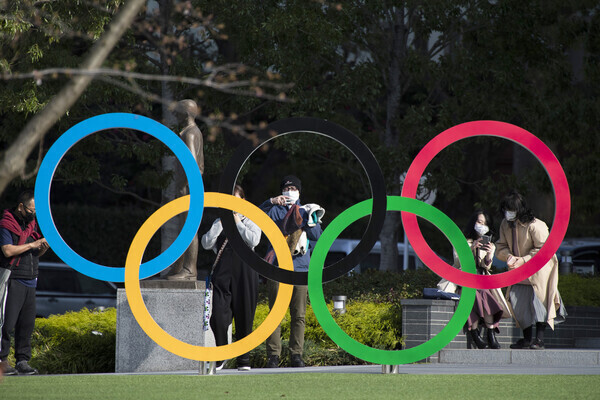hankyoreh
Links to other country sites 다른 나라 사이트 링크
Japan seems to have decided it’s too late to call off Olympics

With around 50 days left until the Tokyo Olympics, the Japanese government appears to have concluded that it’s too late to call off the games.
“We’ve reached the point where halting [the Olympics] isn’t an option,” a senior official from the office of the Japanese prime minister was quoted as declaring in a Wednesday story by the Asahi Shimbun, a Japanese newspaper.
“There’s no turning back now,” another government official said in an interview with the Mainichi Shimbun newspaper, making clear that Tokyo isn’t considering the idea of canceling the Olympic Games.
Although Japan hasn’t managed to stop the spread of COVID-19 and there’s strong domestic opposition to holding the Olympics, the apparent mood in the Japanese government is that it’s too late to cancel the games.
As of Thursday, there are 50 days left until the Tokyo Olympics begin on July 23. Tokyo has apparently begun preparing by administering COVID-19 vaccines to Japanese athletes who will be competing in the games.
More than 200 athletes had received the jab by Tuesday, and around 1,600 athletes and staff are scheduled to be fully vaccinated by mid-July.
“We can now feel safe about holding the games,” said Mitsugi Ogata, a senior official on the Japanese Olympic Committee and supervisor of Japanese athletes at the games.
The first foreign group of athletes has also arrived in Japan for the Olympics. Thirty athletes and staff from the Australian women’s softball team entered Japan via Narita Airport on Tuesday. The team plans to stay in Japan’s Gunma Prefecture to train for the games until July 17.
“The mood will change as more [foreign] athletes enter the country,” a senior official with the Tokyo Organizing Committee of the Olympic and Paralympic Games told the Asahi Shimbun.
But it’s unclear how many foreign athletes are inbound. So far, 105 local governments have nixed plans to put up foreign athletes in training camps because of concerns either on the part of the local governments or the athletes. The number of cancellations more than doubled over the past two weeks, up from 45 on May 14.
More concerns are being expressed about Tokyo’s determination to go ahead with the Olympics. Even the Japanese government’s top advisor for COVID-19 countermeasures, who had previously declined to comment on the Olympics, has gone public with his viewpoint.
“The general opinion of all [members of the subcommittee] is that holding the Olympics at Stage 4 of the infection index will further increase the burden on medical care,” said Shigeru Omi, head of the government’s COVID-19 countermeasures subcommittee, before the House of Councillors Cabinet Committee on Tuesday.
Stage 4 is the outbreak level at which the Japanese government is authorized to declare a state of emergency.
While Omi didn’t directly mention canceling the Olympics, his comments indirectly conveyed his strong concerns.
The Mainichi Shimbun reported that Kazuhiro Tateda, another member of the COVID-19 countermeasures subcommittee, said in a recent press conference that “I don’t think the Olympics can or should be held if the state of emergency continues in Tokyo.”
Tateda is a professor at Toho University and former director of the Japanese Association for Infectious Diseases.
Tokyo is one of 10 administrative districts in the country where a state of emergency is in effect through June 20.
By Kim So-youn, staff reporter
Please direct comments or questions to [english@hani.co.kr]

Editorial・opinion
![[Column] Season 2 of special prosecutor probe may be coming to Korea soon [Column] Season 2 of special prosecutor probe may be coming to Korea soon](https://flexible.img.hani.co.kr/flexible/normal/500/300/imgdb/original/2024/0426/3317141030699447.jpg) [Column] Season 2 of special prosecutor probe may be coming to Korea soon
[Column] Season 2 of special prosecutor probe may be coming to Korea soon![[Column] Park Geun-hye déjà vu in Yoon Suk-yeol [Column] Park Geun-hye déjà vu in Yoon Suk-yeol](https://flexible.img.hani.co.kr/flexible/normal/500/300/imgdb/original/2024/0424/651713945113788.jpg) [Column] Park Geun-hye déjà vu in Yoon Suk-yeol
[Column] Park Geun-hye déjà vu in Yoon Suk-yeol- [Editorial] New weight of N. Korea’s nuclear threats makes dialogue all the more urgent
- [Guest essay] The real reason Korea’s new right wants to dub Rhee a founding father
- [Column] ‘Choson’: Is it time we start referring to N. Korea in its own terms?
- [Editorial] Japan’s rewriting of history with Korea has gone too far
- [Column] The president’s questionable capacity for dialogue
- [Column] Are chaebol firms just pizza pies for families to divvy up as they please?
- [Column] Has Korea, too, crossed the Rubicon on China?
- [Correspondent’s column] In Japan’s alliance with US, echoes of its past alliances with UK
Most viewed articles
- 1After election rout, Yoon’s left with 3 choices for dealing with the opposition
- 2Why Kim Jong-un is scrapping the term ‘Day of the Sun’ and toning down fanfare for predecessors
- 3Two factors that’ll decide if Korea’s economy keeps on its upward trend
- 4Noting shared ‘values,’ Korea hints at passport-free travel with Japan
- 5AI is catching up with humans at a ‘shocking’ rate
- 6Why Korea shouldn’t welcome Japan’s newly beefed up defense cooperation with US
- 7‘We must say no’: Seoul defense chief on Korean, USFK involvement in hypothetical Taiwan crisis
- 8[Column] Season 2 of special prosecutor probe may be coming to Korea soon
- 9Korea’s 1.3% growth in Q1 signals ‘textbook’ return to growth, says government
- 10Exchange rate, oil prices, inflation: Can Korea overcome an economic triple whammy?